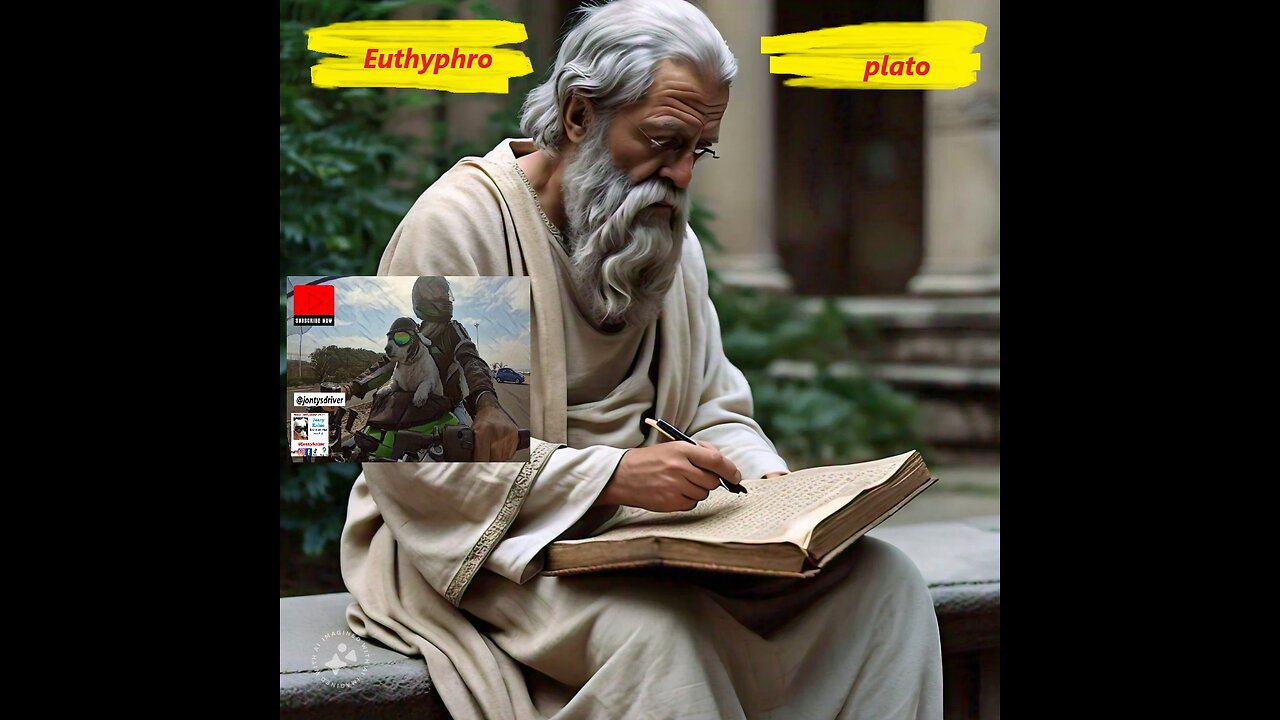Premium Only Content

Euthyphro (Piety) By Plato Audiobook
#Euthyphro (Piety) By #Plato #Audiobook
Plato's Euthyphro is a short dialogue that explores the nature of piety (or holiness) through a conversation between Socrates and Euthyphro. It takes place outside the court in Athens, where Socrates is about to be tried for impiety, and Euthyphro is prosecuting his father for murder. The dialogue raises fundamental questions about morality, divine authority, and justice. Here's a summary:
Setting and Characters
Socrates: The philosopher, seeking to understand the essence of piety.
Euthyphro: A self-assured religious expert prosecuting his father for accidentally causing a servant's death.
Summary
Introduction and Context:
Socrates is surprised to meet Euthyphro at the court and learns about his unusual decision to prosecute his father. Euthyphro claims his actions are pious because they align with the will of the gods.
Socrates, facing charges of impiety, is curious to learn from Euthyphro about the true nature of piety.
Defining Piety:
First Definition: Euthyphro defines piety as prosecuting wrongdoers, like he is doing with his father. Socrates rejects this as an example, not a general definition.
Second Definition: Euthyphro claims piety is what is dear to the gods. Socrates questions this, pointing out that the gods often disagree, making it unclear what actions are universally dear to them.
Third Definition: Euthyphro revises his definition: piety is what all gods love. Socrates introduces the famous Euthyphro Dilemma:
Is something pious because the gods love it, or do the gods love it because it is pious?
This question challenges whether morality is based on divine command or intrinsic reason.
Circular Reasoning and Unresolved Issues:
Socrates continues probing, showing that Euthyphro’s definitions are either circular or insufficient. Euthyphro struggles to provide a clear, universal definition of piety.
The dialogue ends inconclusively, with Euthyphro abruptly leaving the conversation.
Themes and Philosophical Questions
The Euthyphro Dilemma:
The dialogue challenges the idea of divine command theory (morality based solely on the will of the gods) and raises the question of whether moral truths are independent of divine authority.
Nature of Piety and Morality:
Socrates pushes for a universal and rational definition of piety, emphasizing the importance of critical inquiry over blind faith or tradition.
Socratic Method:
Socrates' technique of questioning demonstrates the importance of reason and logic in understanding ethical concepts.
Conclusion
The Euthyphro leaves the central question of piety unresolved, emphasizing the complexity of defining moral concepts and the limitations of relying solely on authority or tradition. It encourages readers to think critically about the basis of morality and justice.
Just a driver on a bike with a dog named @jontyknine
https://www.jontyknine.co.za/driver-contact/
https://www.jontyknine.co.za/driver-contact/
061 513 1103
jontysdriver@gmail.com
Consider a donation to buy food or clothes
https://www.jontyknine.co.za/support/
Shop:
https://www.jontyknine.co.za/shop/
https://my-store-e3d751.creator-spring.com/
#jonty #jontyknine #jontyk9 #durban #biker #dogs #dogsofyoutube #adventure #travell #bikerdog #southafrica #africa #bmw #f800gs
-
 LIVE
LIVE
Bannons War Room
1 year agoWarRoom Live
28,217 watching -
 LIVE
LIVE
Randi Hipper
48 minutes agoBITCOIN AT CRITICAL LEVELS AS MARKET CRASHES! LATEST PRICE UPDATE HERE
390 watching -
 LIVE
LIVE
Matt Kohrs
9 hours agoMARKET CRASH! Trump's Trade War Bloodbath || The MK Show
2,178 watching -
 1:16:40
1:16:40
Graham Allen
2 hours agoCanada WILL LOSE!! Trudeau Enters Trade War With The US! + Zelensky Is Missing 102 BILLION?!
15.4K34 -
 59:17
59:17
Kyle Fortch
1 hour ago $0.15 earnedJon Kilmer: Touring With Kendrick Lamar, Steve Aoki & mike, Creating A Brand | THE ONE SHEET S1E2
11 -
 38:34
38:34
BonginoReport
4 hours agoTrump Obliterates USAID—the CIA's Piggy Bank (Ep.131) - 02/03/2025
66.6K100 -
 LIVE
LIVE
Wendy Bell Radio
5 hours agoBeware The Wrath Of A Patient Man
14,042 watching -
 1:23:17
1:23:17
Game On!
11 hours ago $0.52 earnedHappy Super Bowl Week! Our Top 10 Super Bowl Props to Bet!
11.9K1 -

Jeff Ahern
2 hours agoMonday Madness with Jeff Ahern (6am pacific)
21.3K -
 LIVE
LIVE
SoniCentric
2 days agoSoothing Autumn River Coffee Shop with Relaxing Jazz
184 watching